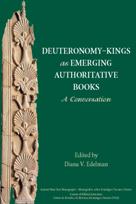Por favor, use este identificador para citar o enlazar este ítem:
https://repositorio.uca.edu.ar/handle/123456789/8008| Título: | Deuteronomy-Kings as emerging authoritative books : a conversation | Autor: | Edelman, Diana V. Levin, Christoph Knauf, E. Axel Amit, Yairah Gillmayr Bucher, Susanne Bolin, Thomas M. Adam, Klaus Peter Römer, Thomas Linville, James R. |
Otros colaboradores: | Edelman, Diana V., (ed.) | Palabras clave: | LIBROS SAGRADOS; Biblia. A.T.; ANTIGUO TESTAMENTO; HELENISMO; PERSAS; AUTORIDAD; Biblia. A.T. Deuteronomio; Biblia. A.T. Josué; Biblia. A.T. Samuel; Biblia. A.T. Jueces; Biblia. A.T. Reyes | Fecha de publicación: | 2014 | Editorial: | Society of Biblical Literature Pontificia Universidad Católica Argentina. Centro de Estudios de Historia de Antiguo Oriente |
Cita: | Edelman, D.V. (ed.). Deuteronomy-Kings as emerging authoritative books : a conversation [en línea]. Atlanta; Buenos Aires: Society of Biblical Literature; Pontificia Universidad Católica Argentina. Centro de Estudios de Historia del Antiguo Oriente, 2014. Disponible en: https://repositorio.uca.edu.ar/handle/123456789/8008 | Resumen: | Introducción: The existence of a “Deuteronomistic History,” consisting of the books of Deuteronomy, Joshua, Judges, Samuel, and Kings, is under review.1 Is this scholarly construct an accurate understanding of what ancient writers of the Hebrew Bible conceived to be a coherent sequence of books that should be read together? Did the books ever form an independent collection, without Exodus, Leviticus and Numbers prefixed, or without Genesis- Numbers prefixed? If we are not as certain as past generations that they ever formed a recognized literary unit,2 why ask what was deemed authoritative about these five books in the late Persian and early Hellenistic periods, by which time it is generally agreed they existed close to their current final forms? The purpose of the present volume is not to focus on the important debate about the status of the so-called Deuteronomistic History, though the results might contribute toward framing arguments on one side or the other. Instead, it is to try to understand the element of authority in relation to each book, which can be construed in two different ways. On the one hand, it can lead us to ask why we have each of the five individual books and what concerns led to their creation using which older materials to address those issues, because these earlier traditions carried some weight of authority for the community of scribes who penned the narratives as well as for their implied target audience(s). Currently, the dates of composition for the various books are generally assigned to the late monarchic period, the Neo-Babylonian period, or the early Persian period. In all three cases, a second question naturally arises then that needs a reasoned response: once created, why would the concerns addressed have had ongoing relevance and resonance for audiences in the late Persian and early Hellenistic periods? | URI: | https://repositorio.uca.edu.ar/handle/123456789/8008 | ISBN: | 978-1-58983-739-3 | Disciplina: | HISTORIA | Derechos: | Acceso Abierto | Fuente: | Edelman, D.V. (ed.). Deuteronomy-Kings as emerging authoritative books : a conversation. Atlanta; Buenos Aires: Society of Biblical Literature; Pontificia Universidad Católica Argentina. Centro de Estudios de Historia del Antiguo Oriente, 2014 Ancient Near East Monographs - Monografías sobre el Antiguo Cercano Oriente. 2014, 6 |
| Aparece en las colecciones: | Series monográficas |
Ficheros en este ítem:
| Fichero | Descripción | Tamaño | Formato | |
|---|---|---|---|---|
| deuteronomy-kings-emerging-authoritative.pdf | 1,69 MB | Adobe PDF |  Visualizar/Abrir |
Visualizaciones de página(s)
227
comprobado en 30-abr-2024
Descarga(s)
474
comprobado en 30-abr-2024
Google ScholarTM
Ver en Google Scholar
Altmetric
Este ítem está sujeto a una Licencia Creative Commons

